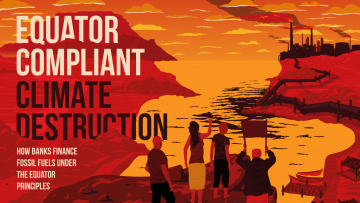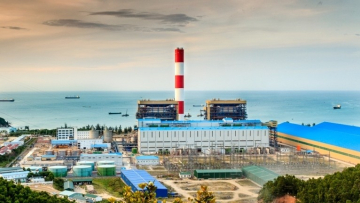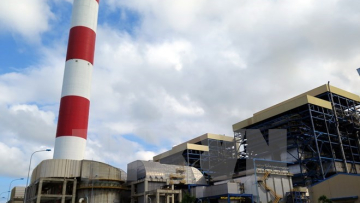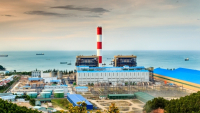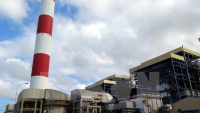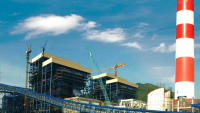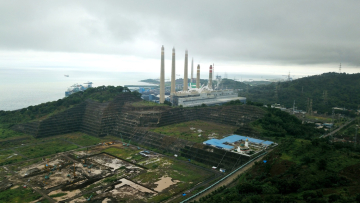
Project – On record
This profile is no longer actively maintained, with the information now possibly out of date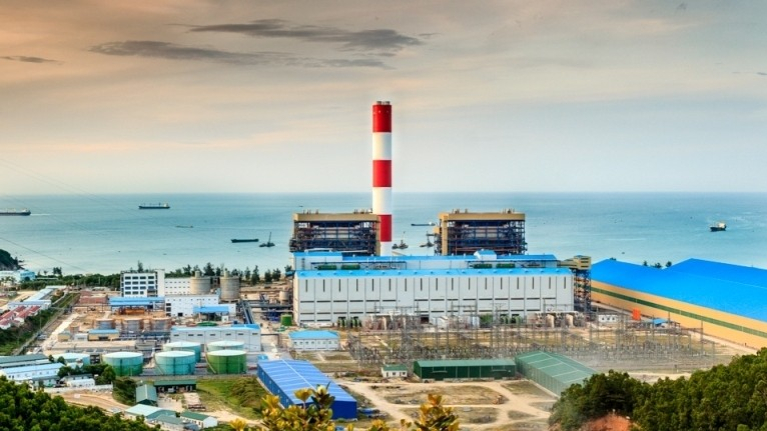
Project – On record
This profile is no longer actively maintained, with the information now possibly out of dateWhy this profile?
The construction of the Vung Ang II expansion of the existing Vung Ang plant will exacerbate environmental pollution and health hazards in the Ha Tinh province, Vietnam. The huge volume of carbon emissions and other pollutants will negatively impact local farmland, contribute to premature deaths, degrade nearby aquatic ecosystems and accelerate climate breakdown.
What must happen
Financial institutions must not participate in the financing of this project in any way. In particular, the Japan Bank for International Cooperation (JBIC) should immediately pull out of the project, which does not comply with its own standards. The private sector Japanese banks involved should close the loopholes in their coal policies and withdraw their support for the Vung Ang II coal power plant.
| Sectors | Coal Electric Power Generation |
| Location |
|
| Status |
Planning
Design
Agreement
Construction
Operation
Closure
Decommission
|
| Website | https://www.pvn.vn/sites/en/Pages/detailv4.aspx?NewsID=2d02afe3-af8c-4566-ba06-4a01d0056539 |
|
|
This project has been identified as an Equator Project |
The Vung Ang coal-fired power plant is located in Ky Loi commune, Ky Anh district, Ha Tinh province in Vietnam. The 1330MW Vung Ang II expansion will be constructed adjacent to the pre-existing, two-unit Vung Ang I, which is already in operation and has a capacity of 1200MW. The first unit of the Vung Ang II expansion is expected to be commissioned in 2024 and the second one in 2025. Both will be fueled by imported anthracite, or hard coal.
Impact on human rights and communities
Dire impacts on health, displacement of communities and disenfranchisement surround Vung Ang I and the Formosa steel plant nearby. Nghi Son 1 and 2 is a coal plant that is developed and financed by the same companies as Vung Ang, KEPCO and PVI Holdings, and has been criticised on the same grounds. Communities have been actively resisting the proposed Vung Ang II project as a result.
Local health and livelihoods The construction of the Vung Ang II coal power plant will exacerbate health and livelihoods impacts on local communities. The power plant will be constructed on a site next to the Formosa Steel plant and the Vung Ang I coal power plant. Because of these plants, residents of the area experienced one of the worst environmental disasters in Vietnam’s history: in 2016, a toxic spill of cyanide and other chemicals from the steel plant destroyed the local fishing economy and damaged 200km of coastline. This permanently impacted marine life and deprived scores of communities of their livelihood. The proximity of Vung Ang I to the same communities has caused health impacts from coal ash heaps and air pollution. For these reasons, the local community is staunchly opposed to the Vung Ang II expansion.
According to a study by Harvard University, pollution from coal power plants in Southeast Asia, South Korea, Japan and Taiwan causes 20,000 premature deaths annually, rising to 70,000 by 2030. The study states that, if all planned coal projects are constructed, this number could rise to 70,000 deaths per year by 2030. The research also found that Vietnam is one of the countries most affected by this air pollution. The construction of Vung Ang II alongside the already existing plants will worsen pollution and health hazards for local communities.
Consultation with local communities According to Friends of the Earth (FOE) Japan, there are signs that ''there was a failure to ensure proper information disclosure and obtain consent from residents'' for the coal plant. Local residents were reportedly forced at a meeting in October 2019 to sign papers selling their farmlands without an agreed price. Furthermore, some families, including those that had been relocated for the Vung Ang I coal power plant, were not informed that they would have to be relocated once more for the Vung Ang II expansion.
Other issues around consultation were already identified in the Environmental Impact Assessment that was signed off in 2011. Read more about these issues here.
Impact on climate
The Vietnamese government announced in 2016 that it would drop plans for further coal-fired power plants. The Vietnam Sustainable Energy Alliance (VSEA) has, in cooperation with the WWF, published a study according to which Vietnam can supply 100% of its electricity demand from renewable energy, proving that there is no need for the plant in the first instance.
As well as being counter to government climate rhetoric and being surplus to requirements, this plant's construction and operation will cause a worsening of climate change. All fossil fuel expansion is incompatible with the goals of the Paris Agreement and significantly decreases our chances of staying below 1.5°C of global warming.
Impact on nature and environment
Air pollution The Vung Ang II coal power plant will cause severe impacts on air quality once in operation. Major air pollutants from the plant include sulphur-dioxide (SO2), nitrogen-oxide (NOx) and fine particulate matter (PM). According to Market Forces, the emissions caused by these pollutants are much higher than limits for new coal plants in other countries. In addition to smoke, the plant will create a huge amount of coal ash. The disposal of this ash poses significant threats to the environment, such as the contamination of ground and surface water.
Water use is another environmental concern. The Vung Ang II coal power plant will use sea water for cooling, after which the heated water will be discharged back into the sea. This discharged water is usually between 5 and 11°C hotter than its original temperature. This “thermal water” threatens aquatic ecosystems, affecting the livelihoods of communities as well as the local ecology.
International standards According to the Environmental Law Alliance Worldwide (ELAW), the Environmental and Social Impact Assessment that was signed off in 2018 does not align with international standards. In April 2020, ELAW found that the 2018 report:
- Failed to examine alternatives that prevent or minimise adverse environmental impacts of the proposed thermal power plant;
- Used the wrong choice of an air pollutant dispersion model that renders meaningless predictions of air quality impacts;
- Applied weaker emission standards for the project than those used internationally;
- Allowed continued wet handling of ash contrary to international guidelines;
- Allowed discharge of thermal effluent in excess of international guidelines; and
- Erroneously dismissed potentially significant impacts to marine species.
Already in 2016, Deputy Minister of Natural Resources and Environment Nguyen Manh Hien stated that the methodology of drafting Environmental Impact Assessments is often inaccurate and has in the past led to environmental disasters and pollution. The Minister for Resources and Environment, Hong Ha, said that the "regulation on EIA has proved infeasible, making it hard to have high-quality EIA reports."
The Vung Ang II coal power plant requires an investment of USD 2.5 billion. According to IJGlobal, the project has a debt-equity ratio of 80:20.
In May 2021, the International Finance Corporation or IFC (private sector lending arm of the World Bank) invested USD $25 million in PetroVietnam Insurance (PVI) Holdings Ltd., an insurance company, amounting to an equity stake of just over 6%. PVI committed to insuring Vung Ang II less than six months later.
In December 2020, JBIC stated that it would co-finance the loan with USD 636 million. Three months later, in March 2021, the bank's governor announced that the bank would cease funding overseas coal plant projects, and that Vung Ang II would be the last such project the bank is involved in.
In November 2019, OCBC Bank was reported to have moved away from this Dodgy Deal. The other Singaporean bank, DBS, also withdrew from the project.
In 2018, Standard Chartered stated that it would no longer finance new coal-fired power plants anywhere in the world, unless a commitment was already made to a project, but one of these projects was Vung Ang II. In 2019 the bank confirmed it would withdraw from this project, thereby closing the loopholes in its 2018 policy.
Inititally, the banks lining up to provide financing for this project included MUFG, Mizuho, SMBC, Sumitomo Trust, DBS, OCBC Bank and Standard Chartered. BNP Paribas acted as financial advisor to these potential lenders. It was reported that this mandate, dating back to 2009 and ending in November 2017, would not be prolonged due to BNP Paribas' new coal policy (which also dictates that BNP Paribas will not finance this Dodgy Deal). Reportedly, the bank was replaced in its role as financial advisor by Mizuho in 2018.
The Vung Ang II coal power plant is owned by the Vung Ang II Thermal Coal Power Company (VAPCO), which is a special purpose vehicle (SPV), currently 100% owned by OneEnergy. OneEnergy is a 50:50 joint venture between CLP Holdings and Mitsubishi Corp.
Mitsubishi has been heavily criticised for its involvement in Vung Ang II. Reclaim Finance reports that Vung Ang II is a central controversy for Mitsubishi and its climate obligations, as it is one of two coal expansion projects the company has. Mistubishi's planned exit from coal by 2050 is 20 years later than the OECD's target for OECD countries like Japan.
As of May 2020, the companies owning the Vung Ang II coal power plant are Mitsubishi Corporation (40%), KEPCO (40%) and Chugoku (20%). These three companies together provide the equity needed for the project (USD 500 million).
CLP Holdings was initially also involved in the development of Vung Ang II. In December 2019, CLP withdrew from the project as it announced it will no longer finance new coal-fired power plants. CLP Holdings was replaced with KEPCO, who acquired its 40% stake in Vung Ang II.
Applicable norms and standards
2020
2020-12-30 00:00:00 | Japan funds Vung Ang II, despite climate vows
On December 30, 2020, Bloomberg Green reported that Japan has approved a plan to help finance the Vung Ang II coal power plant. The Japan Bank for International Cooperation (JBIC) will provide USD 636 million for the construction of the project. The total amount of project finance is co-financed with private banks and the Export-Import Bank of Korea (see also the ''financiers'' section of this profile). This decision goes against Japan's pledge for net-zero emissions by 2050 and stricter conditions when investing in coal projects abroad.
2020-10-05 00:00:00 | Kepco proceeds with Vung Ang 2 coal power project
On October 5, Korea Power Corp. (Kepco) decided to proceed with the Vung Ang 2 coal power plant project in Vietnam. Kepco’s approval comes amid global pressure from environmental and investment groups calling for the company to halt the project.
2020-05-26 00:00:00 | 127 organisation urge Japan to withdraw from Vung Ang II
On May 26, Japanese NGOs submitted a petition for the cancellation of Vung Ang II to the Japanese public and private sectors. The petition was signed by 127 organisation from more than 40 countries. The recipients included the Japan Bank for International Cooperation (JBIC), three megabanks that are considering financing the project (MUFG, Mizuho and SMBC), Mitsubishi Corporation, and Prime Minister Shinzo Abe. Read more here.
2020-04-30 00:00:00 | ELAW finds significant problems with Vung Ang II's Environmental Impact Assessment
In April 2020, the Environmental Law Alliance Worldwide (ELAW) published their evaluation of the 2018 Environmental Impact Assessment (EIA) for Vung Ang II. In this evaluation, ELAW found that the EIA does not align with international standards as it:
- Failed to examine alternatives that prevent or minimise adverse environmental impacts of the proposed thermal power plant;
- Used the wrong choice of an air pollutant dispersion model that renders meaningless predictions of air quality impacts;
- Applied weaker emission standards for the project than those used internationally;
- Allowed continued wet handling of ash contrary to international guidelines;
- Allowed discharge of thermal effluent in excess of international guidelines; and
- Erroneously dismissed potentially significant impacts to marine species.
Read the complete evaluation here.
2020-02-14 00:00:00 | New commission dates
The National Steering Committee on power development reported that Unit 1 is scheduled to be commissioned in Q1 2024 and Unit 2 in Q2 2025.
2019
2019-12-19 00:00:00 | CLP Holdings quits coal
In December 2019, CLP Holdings announced that it will no longer invest in new coal-fired power plants and that it will progressively phase out all remaining coal assets by 2050. With this move, CLP is pulling out of all proposed coal-fired power projects it was already involved in, including Vung Ang II and Vinh Tan III.
2019-10-29 00:00:00 | NGOs call on JBIC not to finance the Vung Ang 2 coal-fired power plant in Vietnam
In October 2019, more then 30 NGOs sent a letter to the Japan Bank for International Cooperation (JBIC) demanding that the bank withdraw from financing Vung Ang II. Find more information and the letter here.
2019-06-04 00:00:00 | Completion date delayed
In June 2019, the Ministry of Industry and Trade reported that the completion date for Unit 1 is delayed to 2023 and the completion date for Unit 2 is delayed to 2024.
2019-03-29 00:00:00 | Vung Ang II is going to use ultrasupercritical technology
In March 2019, OneEnergy reported that the Vung Ang II coal power plant is going to use ultrasupercritical technology, instead of supercritical technology.
2018
2018-07-11 00:00:00 | Ministry of Planning and Investment refuses to grant an investment registration certificate
In June 2018, it was reported that REE transferred its entire holding in VAPCO to OneEnergy. This led VAPCO to apply for authorisation for OneEnergy to become the sole owner of Vung Ang II. In July 2018, the Ministry of Planning and Investment refused to grant an investment registration certificate to OneEnergy to develop the power plant. This decision was based on Decree 63/2018 which says that authorities shall not issue investment certificates for projects executed under the public-prive partnership model. Besides that, the Ministry found several issues in OneEnergy's dossier. Several conditions appeared not to have been met. First of all, the environmental impact assessment for the project was approved by the Ministry of Natural Resources and Environment over two years ago, which means that the assessment is no longer valid. Furthermore, OneEnergy requested an area of 94.6 hectares for the project, while only 86 hectares had been approved by the Ministry of Industry and Trade. Lastly, it was found that OneEnergy does not meet the requirements regarding investment and equity capital. The equity needed is set at USD 555.5 million, 25.4% of the total investment. However, in 2018 the equity was only USD 26.37 million.
These findings led the Ministry of Planning and Investment to ask the Ministry of Industry and Trade and OneEnergy to consider the opinions from relevant ministries and agencies and then develop the project in compliance with regulations.
2016
2016-10-21 00:00:00 | The blacklist: Vietnam names and shames projects with high pollution risks
Vietnam’s Ministry of Industry and Trade has announced projects which it considers are potentially risky to the environment. In a statement, the ministry listed 28 plants which need “special monitoring”, with nearly half of them being coal-fired power projects invested by state power utility Electricity of Vietnam (EVN) and national oil and gas group PetroVietnam. One of the plants in the list, the 1,200MW Vinh Tan II project, grabbed headlines last year due to the environmental pollution it caused (source Vnexpress.net).


